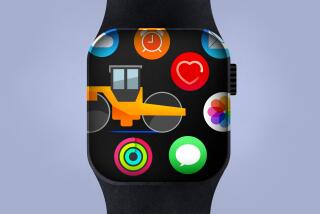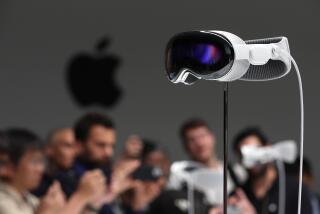Sifting Through Myths, Facts About Apple
- Share via
Myths matter in business, and no company understands this better than Apple Computer Inc. In the years between “the computer for the rest of us” and “think different,” Apple has demonstrated an almost Jungian appreciation for the power of myth to build and sell a brand.
These days, speculation and gossip about Apple’s future has become a popular indoor sport in Silicon Valley. And myths (or at least widely held, fatuous beliefs) from the Dark Side--the ones that see nothing good (or nothing left) in Apple’s arsenal--have become equally common.
So to wrap up 1997--one of Apple’s most tumultuous years--I took a hard look at some key myths and assumptions created by or about Apple that bit the dust this year.
First, let’s give the naysayers their due:
* Apple can and will compete on price.
Apple made only a halfhearted effort to deliver on this widely promoted notion. Notwithstanding the dumping of old models on the market to make room for newer, more expensive ones (or Umax Computer’s great deals on clones), Apple has given up on price competition--and on competing at all in the fast-growing, low-cost market.
(Before you fire off that e-mail message about the G3 machines’ strong price/performance ratio, price out a few comparative models on Gateway and Dell Web sites.)
The question is, does Apple have to compete on price, or can it create a viable business focused on the more expensive media machines that are its greatest strength? We’ll know in 1998.
* Apple is committed to the clone market.
After years of public support but internal conflict, Apple effectively killed the clone market last summer, then predicted that it would regain market share yet keep prices low. Don’t believe a word Apple says about clones or the impact of their demise.
But Apple also turned a few corners this year:
* Microsoft and Apple are bitter rivals.
Bear in mind that while many Mac loyalists view Microsoft as evil incarnate, Microsoft and most PC users respond with a shrug. Bill Gates always works in Microsoft’s best interests, but there’s little evidence that he identifies those interests with Apple’s demise.
Gates even encouraged Apple to license the Mac OS in 1985, as recently reported in a book by Wall Street Journal reporter Jim Carlton. That move might have obviated Windows and changed history.
Microsoft is perfectly happy to collect huge profits from Mac applications--as demonstrated by its recent commitment to develop Mac Office for five years, and its $150-million investment in Apple. And as much as the industry still needs Apple as a spur to innovation and to keep the concept of OS competition alive, Gates likes Apple as a hedge against further action by the Justice Department. Credit Steve Jobs, Apple’s greatest myth maker, with declaring peace.
* Apple has lost its technological edge.
Despite the outflow of engineering talent from Cupertino, this has been a great technology year for Apple. The PowerBook 3400 kept a big performance edge over PCs for many months. The new PowerBook G3 betters the 3400, and the G3 desktops are arguably the best mainstream multimedia boxes ever developed.
Meanwhile, Rhapsody, Apple’s future operating system, is more or less on schedule for release next year. We’ll see if Apple can keep pace in 1998, but it still has the touch.
* Apple never borrows good ideas.
Pricing aside, Apple has done a good job so far of adopting the Dell model for its new Apple Store Web site. And the acquisition of Next and commitment to create a Rhapsody for Intel-based machines shows--like the Microsoft deal--a welcome retreat from useless iconoclasm.
I intended to end this by blasting the growing perception that the Mac faithful are giving up. Although Apple’s share of new PC buyers was dropping like a rock, I hoped to see evidence that repeat buyers were hanging in there. After all, for much of the last decade Mac buyers have been more satisfied and loyal than the buyers of any other computer brand.
Unfortunately, repurchase rates in companies that use mostly Macs are well down from 1996, according to market researcher Computer Intelligence. The data are not complete on individual users, but it’s already clear that 1997 will mark a “precipitous” drop in brand loyalty, says CI analyst Aaron Goldberg.
Myths can be compelling, but reality has its rude way of intruding. So if you love the Mac, this would be a good time to go out and buy one.






